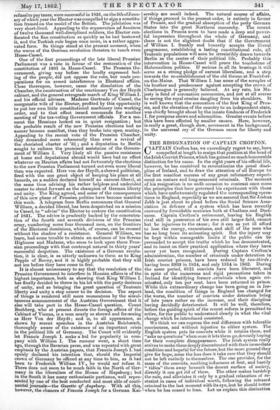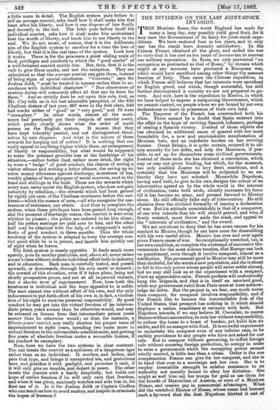THE RESIGNATION OF CAPTAIN CROFTON.
CAPTAIN Crofton has, we exceedingly regret to sayebeen compelled at length to resign that position at the head of the Irish Convict Prisons, which has gained so much honourable distinction for his name. In the eight years of his official life, however, he has contrived to revolutionize the penal disci- pline of Ireland, and to draw the attention of all Europe to the first manifest success of any great reformatory experi- ment on mature and long-seasoned criminals. The moment of his resignation is no unfit occasion to contrast once more the principles that have governed his experiment with those which have unfortunately regulated the corresponding opera- tions in England, especially as we are assured that Sir Joshua Jebb is just about to plead before the Social Science Asso- ciation in defence of a system which has been recently crowned by formidable mutinies both at Chatham and Dart- more. Captain Crofton's retirement, leaving his English rival still in possession of his own still larger field, cannot but be injurious to the cause ; for it can as yet ill afford to lose the energy, earnestness, and skill of the man who has so long been its animating spirit. But the injury may be kept within manageable limits if the public can be persuaded to accept the truths' which he has demonstrated, and to insist on their practical application where they have never yet been recognized. During Captain Crofton's administration, the number of criminals under detention in Irish convict prisons, have been reduced by two-thirds ; having been 3933 in 1854, and only 1314 in 1862. During the same period, 6121 convicts have been liberated, and in spite of the numerous and rigid precautions taken in Ireland for identifying former .criminals when againcri- minded, only ten per cent. have been returned to prison. While this extraordinary change has been going on in Ire- land, the condition of things in England has changed for the worse, the number of convicts under detention being of late years rather on the increase, and their discipline having decidedly deteriorated. It will be well, therefore, before the guiding spirit of the recent reform is permitted to retire, for the public to understand clearly in what the vital change which he introduced consisted. We think we can express the real difference with tolerable conciseness, and without injustice to either system. The English system pets its convicts while it retains them, and "asks no questions" when once it lets them go, devoutly hoping for their complete disappearance. The Irish system really strives to make them deeply discontented with their immediate condition and hopeful for the future, but the more ground they give for hope, none the less does it take care that they should not be left entirely to themselves. The one provides, for the mass of the convicts, soothing influences at first, and hastily " tidies" them away beneath the decent surface of society, directly it can get rid of them. The other makes hardship the rule, and alleviates it only by a gradual relaxation of re- straint in cases of individual worth, following the released criminal to the last moment with its eye, lest he should totter when he has ceased to lean. Let us explain this distinction a little more in detail. The English system puts before it- self an average convict, asks itself how it shall make him fret least after his liberty, and bow it can dispose of him finally and decently in the end. The Irish puts before itself the individual convict, asks how it shall make him understand best the worth of liberty, and teach him to use liberty in the end. We do not mean, of course, that it is the deliberate aim of the English system to smother for a time the love of liberty, but that it is the real issue of the system. Look how it works. There is for the prisoners a great sliding scale of food, privileges and comforts to which the " good marks" of a well-behaved convict entitle him. But, then, first it is the rule to give these marks, and not the exception. They are calculated so that the average convict can gain them, instead of being signs of special excellence. " Convicts," says Sir Joshua Jebb, " must be treated in masses rather than in ac- cordance with individual character." " Due observance of routine duties will commonly effect all that can be done for them." And so strictly does he act upon this rule, that, as Mr. Clay tells us in his last admirable pamphlet, of the 850 Chatham rioters of last year, 697 were in the first class, 640 had marks either of " good" or " very good," and 73 were " exemplary." In other words, almost all the muti- neers had previously got their insignia of convict merit, which pretty clearly shows what the order of merit means on the English system. It means that they have kept tolerably passive, and not distinguished them- selves by new disgrace. And what is the nature of these rewards for keeping out of notice? It is nothing that can really appeal to anything higher within them, no enlargement of liberty or responsibility, but what would be supposed to make the prisoner grumble less at the hardships of his situation,—rather better food, rather more drink, the right to wear a " badge " of good conduct, the chance of seeing a visitor oftener and writing a letter oftener, the saving up an extra money allowance against discharge, accessions of tea, weekly glasses of beer, glimpses of social converse, suet in the hand and shillings in the bush. These are the newards which every man earns under the English system, who does not gain notoriety by rebellion,—the rewards which had been gained by eighty per cent. of the Chatham mutineers before the out- break—which the masses of men,—all who recognize the use- lessness of resistance, can attain. And then to complete the system, when these privileges have been gained long enough, and the moment of discharge comes, the convict is sent away whither he pleases ; the police are ordered to let him alone ; half his prison earnings are paid over to him, and the other half may be obtained with the help of a clergyman's certi- ficate of good conduct in three months. Thus the whole tendency of the system is adapted to keep the average con- vict quiet while he is in prison, and launch him quickly out of sight when he leaves.
The Irish system is nearly opposite. It feeds much more sparely, puts by smaller gratuities, and, above all, never raises a man's class without definite individual effort both in industry and in education. Each man is carefully tested, and passed upwards, or downwards, through his own merit or demerit ; the reward of this elevation, even if it takes place, being not chiefly prospective pence, and not at all improved victuals, but a shorter term of imprisonment. Now, here both the treatment is individual and the hope appealed to is noble. The man cannot rise without effort of his own, and the only inducement to put forth effort of his own is, in fact, a vindica- tion of his right to exercise personal responsibility. By good conduct he may get into the virtual freedom of an interme- diate prison years sooner than he otherwise would, and may be released on license from that intermediate prison years sooner than he otherwise would ; so that, for instance, a fifteen-years' convict may really shorten his proper term of imprisonment to eight years, spending two years more in virtual freedom in the intermediate establishment, and getting five years of absolute freedom under a revocable license, if his conduct be exemplary. Now, here we have the two systems in clear contrast. The one treats the convict as a specimen of a dangerous type rather than as an individual. It soothes, and bribes, and pets that type, and brings it unexpected tea, and gratuitous beer, and gratifies it with gaslight, and promises it cash, if it will only give no trouble, and depart in peace. The other treats the convict with a hardy simplicity, but holds out hope of earlier freedom if he will only earn that freedom, and when it has given, anxiously watches and aids him in, his first use of it. Is it Sir Joshua Jebb or Captain Crofton who can teach us how to avoid mutiny, and inspire in criminals the hopes of freemen ?































 Previous page
Previous page